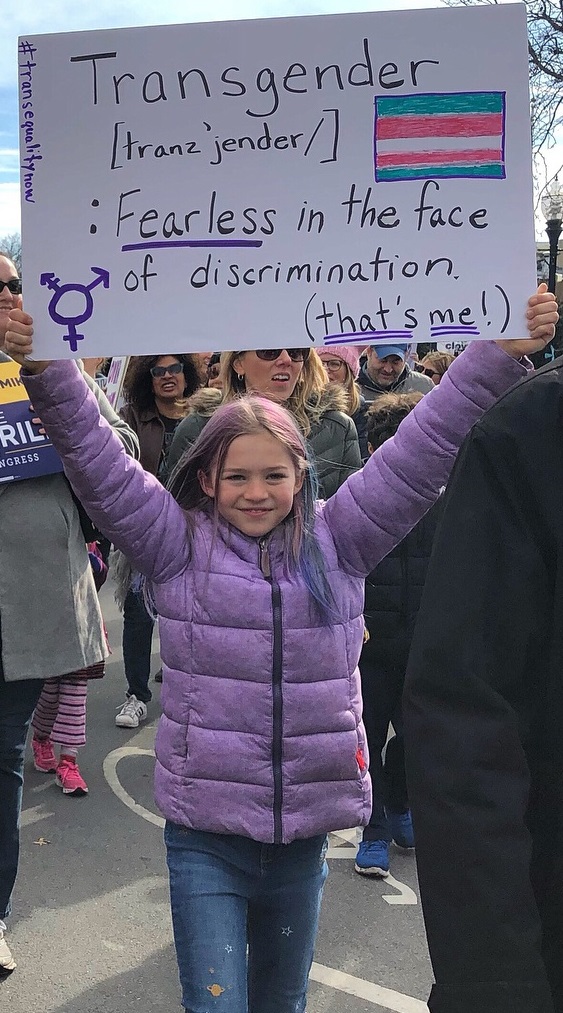
Elaborate headdresses, skirts and sweeping gowns of silks and satins – this is what you’ll find in 10-year-old Desmond Napoles’ wardrobe. The New Yorker has had an affinity for feminine clothes since he was a toddler and declared himself a homosexual and a ‘drag kid’ (a young drag queen who dresses in women’s clothes) a few months before he was ten. As of this year, Napoles has come up with his own house of drag specially for kids.
Napoles has participated in every NYC Pride march since 2015, cut the ribbon at the opening ceremony of DragCon NYC in 2017 with RuPaul and attended DragCon LA. “It feels amazing (when I put on drag) because I am expressing myself. I feel pretty – I feel like I am inspiring,” says Napoles, who, while quite comfortable with dressing up as a female, is quite sure that he’s a homosexual male.
New Jersey-based Rebekah Bruesehoff is another 10-year-old fighting for LGBTQ rights. At seven, she shed her male identity as Benjamin and started living as a girl. ‘I am the scary transgender person the media told you about’ said her placard at a protest rally against the Trump government scheme rescinding the previously-standing policy protecting trans students in schools against discrimination in a Facebook post gone viral.
Most transgender individuals identify themselves with their desired gender when they are just toddlers. While many kids like to dress up in the clothes of the opposite gender, not all of them may identify with the opposite gender. Napoles, for instance, identifies as a boy (the gender he was born as) even though he likes to dress in drag (female costumes). The courage to be themselves, whether by simply wearing clothes assigned to another gender or completely identifying with it, came largely thanks to the family support and awareness.
While Rebekah’s mother Jamie Bruesehoff blogs about being a mother to a transgender child, Desmond’s mother Wendy Napoles has been hands-on with her son’s venture.

Rebekah Bruesehoff
“It felt a little awkward at first. We went to a therapist and he told us not to encourage nor discourage his behavior and to just let him develop naturally. So, that is what we did and the awkward feelings went away quickly,” explains Wendy, adding that the family has grown together since Desmond came out as gay at the age of nine, and also expressed his desire to start a drag house. “One way we have grown is that we are always learning so much about LGBTQ history and culture with Desmond. It really brings a lot of love, respect, and humility to one’s life to work with all of the amazing people in the LGBTQ community.”
At 10, Napoles has already figured out what he wants from life as a fashionista and an LGBTQ activist. “My goal as a drag kid is to encourage everyone to be themselves and to help stop bullying. As a fashion icon, I want to be a supermodel like Linda Evangelista and walk the runways around the world,” he says.
On the other hand, Delhi-based Taksh, 23, recalls having feminine traits at just three years of age. A lack of information meant that she had to go through a harrowing puberty, until she stumbled upon the meaning of transgender online. “It was like everything clicked into place. As a 15-year-old boy, I felt that my body was just wrong; in that moment I knew why,” she recalls.
Still it was only at 18 that she was able to come out to her parents as a transgender woman. The freelance stylist and model recalls that the process was smoother since his doctor parents were more aware than most Indian parents. Taksh recalls, “Though they were shocked, they were understanding and even sat the extended family down to explain it to them.” This was a contributing factor as to why she never had to face any criticism from family.
However, stares and comments in public are commonplace. Something as simple as using public transport is uncomfortable. “Many are simply ignorant of transgenders. They don’t know something like this can happen. As I’ve always dressed in feminine clothes, I’ve often been mistaken for being flamboyantly gay. Then, I explain that I am a trans woman, what that entails, and most times they come around, though sometimes I get questioned further.”
Taksh, who finally had her sex-change surgery this February, says she went so far as to read papers by Michel Foucault, Judith Butler and others to expand her knowledge about LGBTQ issues. “I always thought advocacy should be left for older people with more life experience, but people ask me questions, simply because I am trans,” she shrugs.
Dr Richie Gupta, senior consultant and head of the department of plastic, cosmetic and reconstructive surgery at Fortis Hospital Shalimar Bagh, Delhi, who is an authority in sex change operations in India, says that most individuals who have come to him for surgery and hormone therapy have confessed to being aware of their gender preferences since a very young age. “Most are aware of it since they are as young as two or three years old. And when they have the cognitive understanding of what it means to be transgender, they identify themselves as such," he explains.
Even so, when children claim to be transgender at a young age, or come out and start living as a gender that opposes the one they were born with, they and their parents are stigmatised. In a video by Barcroft TV, Jamie read out one of the comments on Rebekah’s Facebook post holding the transgender person placard, “This is embarrassing. First she is what? 10, I think I read. Hey, at 10, she isn't mature enough to make this decision. This decision was forced upon her by her parents. This is a form of abuse not recognised...”
The blogger and activist also said that encouraging Rebekah to transition and start living as a girl from the age of seven is what countered the severe anxiety and depression she had been facing as a boy child. It was through therapy that they had come to their conclusion.
Therapy, says Dr Gupta, is absolutely essential in such cases. “Sometimes, this is just a phase, and on other occasions, the child turns out to be transgender,” he explains. “A diagnosis is also needed, as experts say that sometimes, it may be a case of multiple-personality disorder, or schizophrenia, wherein a person identifies as not one, but many people. Once any psychological disorder is ruled out, the child can continue to live as their preferred gender for as long as they like.”
While the doctor mentions that sex change and hormonal therapy has been started in children as young as nine and ten in Norway, in India, few cases are seen where one opts for therapy before 18 years of age, although, according to the doctor, 14 is old enough to be sure of one’s gender.
Trans activist Manobi Bandopadhyay, who was one of the first transgender people in the country to undergo surgery, says that prejudice is a big contributor to this delay. “A child comes with a clear mind, and can cut to the heart of the matter. They are not aware of societal standards of what one ‘should’ and ‘should not’ do,” she explains.
“However, by the time they are old enough to understand, they have already been bogged down by societal expectations.”
Referring to the disparity between developed and developing countries when it comes to prejudice, she says, “Norway is the land of the midnight sun. Perhaps this is why their thought processes are more enlightened. However, if you look at how the hijra community is treated in India, Bangladesh and other third world countries as compared to the West, you will realise why we are so much more rigid than they are. After all, in a country where the third gender has to sell their bodies or beg to survive because they are ostracised by society, how can you expect acceptance for other differences?”
Bandopadhyay points out that in Western countries, individuals of the third gender are also given equal respect and work regular jobs. The existence of Section 377 also acts as an obvious deterrent to creating a liberal mindset. “I do not think that countries like India can ever reach that level of consciousness; not when there is so much prejudice abound,” she laments.
While the disparity between countries is obvious, Dr Ghosh says that there has been a marked improvement since he first started doing surgeries over a decade ago. The average age of his patients has fallen from middle-age to the youth. “When I first started out, I would get patients of at least 30 years of age, some were even over 60,” he recalls. “In comparison, today, we have younger people, in their early 20s coming in for the surgery.” This, according to the doctor, is an encouraging sign, since it means that people are becoming more and more aware of, and comfortable with, their gender at an earlier age.
“I never had a moment’s regret while I was undergoing the surgery and recovery process,” says Taksh, and Dr Gupta says that he is yet to face any case of regret for having undergone the sex change operation.
While Wendy suggests ignoring negativity altogether – “We do get a lot of hate, but I don't engage with the haters. I feel like they want attention and I am not going to give them that. I just report, block, and delete” – a higher level of sensitisation, and sensitivity is really the need of the hour.